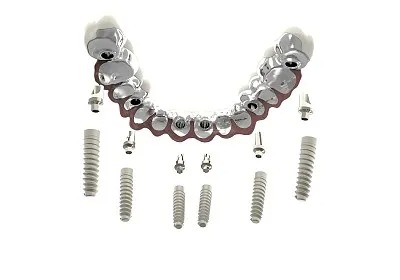The Comprehensive Guide to Understanding Dental Implant Treatment Benefits Challenges and Recovery Process for Optimal Oral Health
Summary: This comprehensive guide delves into dental implant treatment, exploring its numerous benefits, potential challenges, and the recovery process that aids in achieving optimal oral health. Dental implants have emerged as a popular solution for tooth loss, enabling individuals to regain their natural smile and functionality. We will discuss the significant advantages they offer, such as improved aesthetics and enhanced chewing capabilities, alongside challenges like the costs involved and the healing process. Understanding the recovery timeline and aftercare is essential for ensuring long-lasting, successful results. This article aims to provide a well-rounded perspective on dental implants, empowering patients to make informed decisions about their oral health.
1. Understanding the Benefits of Dental Implants

Dental implants offer a plethora of benefits that go beyond mere aesthetics. One of the primary advantages is their ability to restore functionality, allowing patients to chew and speak more effectively. Unlike dentures or bridges, which may shift or come loose, dental implants are securely anchored into the jawbone, providing a stable and permanent solution for tooth loss.
Moreover, dental implants play a crucial role in maintaining jawbone structure. When teeth are lost, the underlying bone can deteriorate due to lack of stimulation. Implants help stimulate the bone, preventing further loss and preserving the shape of the face. This also aids in maintaining other dental structures, contributing to overall oral health.
Another significant benefit is the enhancement of self-esteem. Patients who have undergone implant treatment often report improved confidence levels due to their restored smile. This psychological boost can lead to a more positive outlook on life and improved social interactions, showcasing how oral health directly affects overall well-being.
2. Challenges of Dental Implant Procedures
While the benefits of dental implants are appealing, it’s essential to consider the challenges associated with the procedure. One major consideration is the cost, which can be substantial. Dental implants require a significant investment, often exceeding the costs of traditional dentures or bridges. This financial factor can deter some patients from pursuing treatment.
Additionally, not everyone is an ideal candidate for dental implants. Factors such as existing health conditions, smoking, or insufficient bone density can make the procedure more complex or even unfeasible. This necessitates thorough assessments and consultations with dental professionals before deciding on the treatment.
The surgical nature of the procedure brings with it risks and complications, such as infection or nerve damage. While these occurrences are rare, they highlight the importance of choosing a qualified dental surgeon and adhering strictly to pre-and post-operative guidelines to mitigate risks.
3. The Recovery Process Explained
The recovery process after receiving dental implants is pivotal for the success of the treatment. Following the surgery, patients can expect a healing period that may vary from a few days to several weeks, depending on individual circumstances. During this time, its crucial to manage discomfort and follow the dentists recommendations to ensure proper healing.
Post-operative care includes maintaining oral hygiene while avoiding strenuous activities that might jeopardize the implant site. Regular follow-up appointments are essential to monitor healing and address any issues promptly. These appointments provide opportunities for professional cleaning and assessments of implant integration with the jawbone.
It is also essential to adopt a soft food diet during the initial recovery phase to prevent any undue strain on the surgical area. As healing progresses, patients can gradually transition back to their regular diet. Understanding this timeline helps in setting realistic expectations for recovery and restoring normalcy in daily routines.
4. Long-Term Aftercare for Dental Implants
Long-term aftercare is critical for the longevity and success of dental implants. Regular dental check-ups allow for the monitoring of implant health and surrounding gum tissue. Professionals can identify early signs of issues such as peri-implantitis, a condition that can threaten the stability of implants if not addressed timely.
Patients are also encouraged to practice diligent oral hygiene, including brushing and flossing around the implant area. Special tools, like interdental brushes, can aid in cleaning hard-to-reach areas, thus minimizing the risk of infection and ensuring the longevity of the implants.
Finally, maintaining a healthy lifestyle contributes significantly to the success of dental implants. Avoiding habits such as smoking, which can impair healing, and opting for a balanced diet rich in nutrients will support oral and overall health. Regular exercise and stress management also play crucial roles in recovery and long-term health outcomes.
In summary, understanding the comprehensive aspects of dental implant treatment—from its benefits and challenges to recovery and aftercare—enables patients to make informed choices about their oral health. Patients should weigh the pros and cons carefully and consult with dental professionals to explore the best options for their needs.
This article is compiled by Vickong Dental and the content is for reference only.



